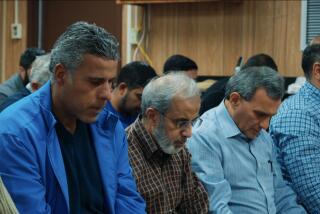Changing Lifestyles : Silk Road ‘Descendants’ Nurture Muslim Faith : * In a tiny Chinese hamlet, the imam dreams of a new mosque. And perhaps he will get it. Islam is undergoing a resurgence in the Communist country.
- Share via
WUDAOLING, China — Bao Xueli has two dreams. One is to make a pilgrimage to Mecca before he dies. The other is that his village will build him a real mosque.
Bao, 81, is the imam, or Muslim religious leader, of a recently established village on newly irrigated land in the Ningxia Hui Autonomous Region of north-central China. His two dreams tell something of a people’s faith--a faith that is struggling to survive and, perhaps, reassert its primacy.
The imam’s hamlet was established just six years ago, when more than half the people of old Wudaoling, a village without access to irrigation, resettled here in new Wudaoling. All 58 families of the new village are members of the Hui minority, a Muslim ethnic group descended from Persians and Arabs who traveled the medieval Silk Road and intermarried with ethnic Chinese.
The Hui speak Chinese, rather than any separate language of their own, but have maintained a Muslim identity over the centuries. Their Islamic traditions came under fierce attack, however, during the 1966-1976 Cultural Revolution, when radical leftist Red Guards assaulted almost everything old. Mosques were shut down or destroyed. Bao, like other imams, could no longer preach.
For years during the Cultural Revolution, Bao was forced to work as a peasant. He returned finally to the life of an imam in 1983.
“My main job is to educate the people here to do good things,” Bao explained, seated on a rug in a bare, whitewashed room adjacent to his home, which serves for now as the village mosque. “I teach them according to the Koran. If the Koran says ‘Yes,’ then you can do it. If the Koran says ‘No,’ you can’t do it.”
Drinking, murder and rape are among the sins Bao said he lectures against.
From the outside, Bao’s mosque looks like any other village house. Ma Zhongbao, one of the most faithful of the worshipers, said that the villagers first built the simple structure, which was the best they could do at the time, and then invited the imam.
“I came in 1989,” said Bao, a bearded man wearing gray trousers, a bright white shirt and the traditional white cap of the Hui. “The people of this village asked me to come because they thought I was a good imam.”
But Bao, who began formal study of Arabic and the Koran when he was 12, is not entirely satisfied. And he is not above making his wishes known. The people of this village used to be extremely poor, but now that they have access to irrigated land, they are beginning to taste prosperity. Bao’s demands come against this background.
“Imams in other places are richer than me,” Bao explained. “I am poor, so I have no money to go to Mecca. Some rich imams have already gone. So I want the people of this village to solve the problem for me.”
Bao also feels that the plain, whitewashed room where the faithful gather to pray five times a day is not a proper mosque, nor does it provide the conditions to train a successor generation.
“If I had better economic conditions, I could teach young people religion,” he said. “I hope the village can build a better mosque. If it does, I never want to go anywhere else again. I’ll stay here until I die.”
While Bao has no successor in training, and an architecturally attractive mosque is still just a gleam in his eye, the spirit that motivates him and the village faithful is resurgent among the Hui and other Muslim minorities of China.
Restrictions on the training of future imams remain severe in the far western region of Xinjiang, where relations between Muslim Uighurs and ethnic Chinese are tense. There, mosques and religious schools have been accused of being training grounds for separatists who hope to break parts of Xinjiang away from China. The regional government has restricted construction of new mosques.
But the mood in Ningxia, the part of China with the largest concentration of Hui, seems more relaxed. In the town of Tongxin, not far from Bao’s village, young men at one mosque said they were among 20 youths studying to become imams. Another Tongxin mosque, they said, has 100 students of the faith.
Traveling through the Ningxia countryside, one often sees new mosques under construction or old mosques being repaired. Bao, it seems, is not alone in his dreams.
Ma, 59, said he believes that religious faith is now getting stronger among young Hui, even though many are so busy with work that they don’t come regularly for prayer. Everyone participates in major religious festivals, he said.
Asked whether the imam’s comments constituted a veiled threat to move to another village if the people here ignore his wishes, Ma indicated that this might well be the case, but that he wasn’t worried.
“If we build a better mosque,” Ma said cheerfully, “then he’ll stay.”
More to Read
Sign up for Essential California
The most important California stories and recommendations in your inbox every morning.
You may occasionally receive promotional content from the Los Angeles Times.










